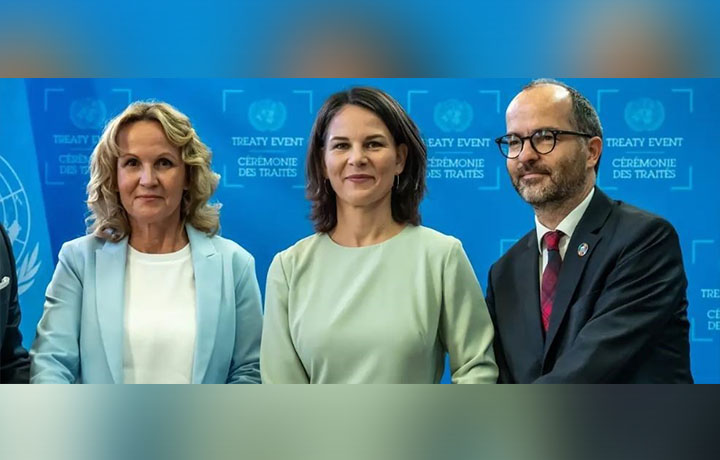Agnes Chow speaks about life in exile
After announcing that she would not return to Hong Kong from Canada, the pro-democracy activist says she fears China’s global reach.
In August this year Agnes Chow crossed into mainland China filled with fear. The young activist was in the company of five national security police, taking her from her home in Hong Kong, on what she says was a “propaganda tour” organised by authorities in return for her being allowed to study overseas.
Police had told her the tour was mandatory if she wanted them to return her passport, which they’d confiscated years earlier as part of her bail conditions. Chow is a key figure in Hong Kong’s most significant pro-democracy movement in the last decade, pushing back against Beijing’s increasingly authoritarian rule in Hong Kong.
Chow says she was informed of the alarming demand to cross into mainland China – made outside any known regulation or law – in July, and was banned from telling her lawyer. “For that month I was really afraid that I wouldn’t be able to get back to Hong Kong,” she says.
“If anything happened in mainland China no one would know, no one would come to rescue me. It was really horrible. And it was a total disrespect to the rule of law.”
Chow is speaking to the Guardian from Toronto, just days after revealing in an Instagram post that she had moved there to study, but had decided not to go back to Hong Kong, perhaps ever.
In 2020 she was jailed for seven months on convictions related to the 2019 protests that swept Hong Kong, and then arrested again in 2020 on accusations of “colluding with foreign forces” under the controversial national security law, introduced to crack down on the movement. Released on bail in 2021, she had to turn in her passport and report regularly to police.
But the pressure of life in Hong Kong – the constant vigilance, silence, and a lack of contact with anyone from her former political circles – had affected her mental health and she began to consider leaving.
Chow was accepted into a Canadian university course and asked the national security police if she could go. They demanded information about the course, timetable, accommodation and other records, and asked her to write a “repentance letter” saying she regretted her past political involvement, and commit to returning during semester breaks. Then they said she was going on a day trip to mainland China.
“I’m not sure who planned this trip, [but] I know the reason is they want to kind of reeducate me,” she says.
Chow says officers took her to a patriotic exhibition on China’s economic development and the achievements of the Chinese Communist party, and to the headquarters of tech giant Tencent. She says the officers spoke to her normally throughout the day, but she wasn’t told anything of the itinerary. Driving back over the border into Hong Kong, she breathed a sigh of relief.
“But when they drove me back to Hong Kong I was also afraid they would still not really return my passport,” she says.
Chinese authorities have a long history of taking dissidents on enforced holidays around sensitive times, like the Tiananmen massacre anniversary, but it is unusual for Hong Kong.
In one of the only other known alleged instances, Grandma Wong, a well-known figure at Hong Kong rallies, disappeared in 2019 for 14 months, before reappearing in Hong Kong claiming she’d been detained and interrogated on the mainland and also taken on a “patriotic trip”.
“The Hong Kong police are becoming closer and closer to the mainland style on how to deal with political dissidents,” says Chow.
Until her two-part post last Sunday Chow had not spoken publicly since her release from jail.
She says her decision to stay in Canada – made only in recent weeks – was influenced by the worsening political situation in Hong Kong. Under a society-wide crackdown on dissent driven by Beijing, authorities have overhauled the electoral system to ensure only approved “patriots” can run, issued international arrest warrants for opposition figures, and aired mainland China-style televised confessions.
Chow had fulfilled all the requirements from police to be allowed to leave Hong Kong, but felt there was no guarantee the authorities wouldn’t change their minds on one of the trips back to the city.
“I was afraid that I may not be able to come back to Canada, or that even if they let me … they would require me to fulfil some more kinds of conditions. For example go to mainland China again, or provide information about myself or people around me,” she says.
“What I wish is just to live freely and not be forced to do something I don’t want to do, including going to mainland China.”
There is a sense that Chow is now saying everything she wanted to before but couldn’t. But it’s not without risk, and there is trepidation in her voice.
“I’m concerned about my personal safety here in Toronto,” she says. “Canada is a democratic country which respects human rights and freedom, but I read some news reports about Chinese overseas police, secret police in different countries, including Canada.”
After Chow announced on social media that she would stay in Toronto, the authorities responded with anger. Hong Kong’s chief executive accused her of “complete deception”, calling her a liar and a hypocrite. His pledge that she would be “pursued for life”, along with the urging from Hong Kong police that she “not choose to take a path of no return and bear the name of ‘fugitive’ for the rest of her life” were noted for their similarity to rhetoric normally heard from the Chinese Communist party.
“I feel their responses are ridiculous. John Lee said they tried to be lenient to me. Why would the authorities speak of the word lenient? In the last three years I only felt the infringement of my personal freedoms and rights, they were in no way lenient. They imposed unfair restrictions on my life.”
Chow rejects the accusations she was or is a foreign agent, saying there is no evidence. Instead she accuses the authorities of using the national security law – introduced in 2020 in response to the pro-democracy protests of the previous year – as a weapon against dissidents.
Chow still suffers from the mental toll of life in Hong Kong as an activist.
“Compared to my life in Hong Kong I know I’m kind of safer than before, but to be honest after I arrived in Toronto I still sometimes have panic attacks and depression attacks,” she says.
“After I arrived in Toronto the [Hong Kong] national security police called me twice, one time in September and another time in October. They asked how my life was going here, things like that, and I felt like they tried to make me feel like they were still monitoring me.”
The Guardian contacted Hong Kong police for comment, but was instead referred to previous statements. Police and government officials have not disputed claims Chow has made about being sent on a “propaganda tour” and have refused to answer what rules or regulations allowed it to take place.
Source: The Gaurdian
11 Dec 2023,19:44


















 Live Tv
Live Tv









